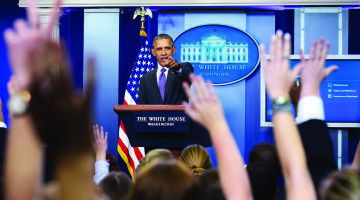
Breanna Denney/Nevada Sagebrush
Gov. Brian Sandoval delivers last year’s State of the State address inside the Assembly Chambers in Carson City on Thursday, 3Jan. 15, 2015. His address marked the start of Nevada’s 78th legislative session, a session that saw the passage of more than 500 bills.
By Jacob Solis
State politics, unlike its federal counterpart, is an often overlooked part of any American’s daily life. This goes doubly for young Americans (read: college students), who are less politically active than any other demographic, according to the Census Bureau. But even if Americans aren’t paying that much attention, state governments are still hammering away at all kinds of legislation that directly affects the daily grind.
Nevada is no exception, so without further ado, here’s the year in Nevada politics.
The legislative session
The Nevada Assembly and Senate only convene once every other year for a brief, five-month stint where all the legislating for the next two years has to happen, barring any special legislative sessions.
In 2015, Nevada’s 78th legislative session started with a bang after Brian Sandoval announced a revamped budget during his biennial State of the State address that allocated nearly $900 million for education. This revamp included millions for K-12 schools to improve everything from technology to gifted and talented programs, as well as some added money for the University of Nevada, Las Vegas’ hospitality school and proposed medical school.
To pay for all this, the Legislature eventually approved a host of tax reforms, including $560 million in the continuation of the so-called sunset taxes, which were enacted in 2007 and were engineered to expire, not unlike the sun after a long day (hence “sunset”), once the state no longer needed the money.
In terms of actual policy, most legislation was passed with ease or quietly smothered in committee, and spats in the statehouse were few and far between. However, there was a notable rift among legislators when it came to the campus carry debate, where GOP lawmakers led by Las Vegas Assemblywoman Michele Fiore sought to allow concealed carry weapons on school grounds.
Legislators fought the entire session over campus carry before the effort was shut down in committee just days before legislators packed up and left. In any case, legislators passed 550 bills by session’s end, all of which were signed into law by Gov. Sandoval.
Outside the normal session, Sandoval convened a special legislative session at the end of the year to review a $1 billion deal between the state and Faraday Future, an electric car maker seeking to build a 900-acre factory in North Las Vegas. That deal comes on top of Nevada’s deal with car-maker Tesla Motors to build the “gigafactory” just outside of Reno.
New laws of note
With Senate Bill 374, the Legislature directed the Nevada Public Utilities Commission to revise the rate structure for Nevadans using rooftop solar panels. On Dec. 22, the commission voted unanimously to increase rates, drawing the ire of solar providers in the state. These providers have argued that the changes do more to hurt solar energy in the state by disincentivizing consumers to switch to solar.
Senate Bill 307 has now made it unlawful for lobbyists to give legislators gifts and prohibits legislators from accepting “anything of value,” according to the Las Vegas Review-Journal. In other election news, voters can now choose to receive an electronic sample ballot as opposed to receiving a paper ballot in the mail with the passage of Assembly Bill 94.
Senate Bill 302, arguably the most controversial new law, allows parents to get state funds to pay for private school tuition. Part of Sandoval’s sweeping education reforms, the law is aimed at providing parents whose children are zoned for under-performing public schools to choose private school instead. Some 4,000 parents have signed up for the program, according to the RJ, but these parents are now stuck in limbo as a state judge has granted an injunction to the law’s opponents, effectively stopping its implementation.
Opponents of the law have called it unconstitutional because it provides public school funds to pay for private tuition, potentially harming public school students while violating a 2006 amendment to the Nevada constitution that requires the Legislature to appropriate funds for public schools before all other funds.
This new law would mean that extra funds are siphoned away from that initial pool for public schools, reducing the amount that the Legislature had previously “deemed sufficient,” and thus would be unconstitutional.
The fight over Senate Bill 302 will likely continue into the coming months as it heads all the way to the Nevada Supreme Court.
Jacob Solis can be reached at jsolis@sagebrush.unr.edu and on Twitter @TheSagebrush.











